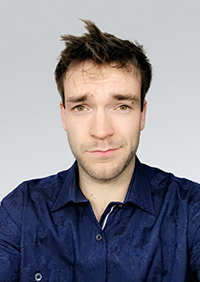 How did you hear about the BEST program? What made you want to apply?
How did you hear about the BEST program? What made you want to apply?
I learned about the BEST program through conversations with Associate Dean Vanessa Ryan about graduate student support. I attended Brown as an undergraduate and was blown away by the wide variety of resources that were built into my undergraduate experience ranging from peer advising, mentor programs, student groups and academic support. I contacted Dean Ryan to see if there were similar programs for graduate students.
How has or how will this program help you in your career or studies after Brown?
Whenever people ask me about my experiences and takeaways from Brown, I always say that the most valuable part of the University is the access to incredible people. I think it’s really easy to get siloed within your department or lab in graduate school, but I'd encourage students to venture out because we learn a lot from people who approach problems from a different framework whether that framework is their field-specific knowledge or personal experience. The BEST program facilitated those types of interactions by selecting a wonderful cohort of students and administrators from a wide-variety of fields who brought a critical lens and mutual respect to our meetings each week.
Did you already have a career plan in mind? Has this program influenced you in any way to change/alter it?
I’m currently trying to narrow down my career options. The BEST program and other experiences in graduate school have helped me take a holistic approach to the job search. I am evaluating employers/departments based on their culture, mission and values instead of focusing on job titles or trying to imagine the potential day-to-day work from an obscure description in a job posting. I think I would be happy working in a wide-variety of fields and in a number of different capacities, but Brown has taught me that the people I’m working with and surrounded by make all the difference.
Who was your administrative sponsor and what did you learn or enjoy about working with them?
I was paired with Je-Shawna Wholley, Assistant Director of the LGBTQ Center. I have been so amazed by the Center, and specifically Je-Shawna’s capacity to create affirming, intersectional spaces and events for members of the LGBTQ community at Brown. Moreover, it was incredibly instructive to learn a little bit about the operational challenges that come with running a Center, such as balancing budgets, piecing together funding streams and navigating institutional dynamics while simultaneously generating content, events and providing support for students, faculty and staff.
What piece of advice provided by the speakers resonated most with you?
I think we often imagine a linear career trajectory; it’s more predictable and consequently feels more stable. However, almost all of our speakers noted the non-linearity of their careers and that they could not have predicted being in their current position. As a graduate student in an academic department surrounded by faculty who for the most part followed a similar career trajectory, it was really valuable and reassuring to hear that the traditional tenure-track academic route is not the only option.
Did you complete a mini-practicum project? If so, tell us about the project and why you chose it.
For my mini-practicum project, I focused on the operational aspects of starting a new Brown University chapter of Out in STEM (oSTEM), which is a STEM advocacy organization for the LGBTQ community. I chose the project because I think it’s important to develop a community of LGBTQ students, staff and faculty in STEM to address systemic issues about identity and representation. STEM fields often promote a “check your identity at the door” policy that drastically impacts workplace satisfaction and retention, particularly for people from marginalized identities.
One of the major challenges to developing the group has been the University’s policy requirement that groups be designated for either undergraduate or graduate students, which dictates eligible funding streams. This policy makes it more difficult to develop groups with memberships that span undergraduate, graduate, staff and faculty, which is often the case for identity-based organizations. Bridging meaningful interactions between undergraduates, graduate students, staff and faculty is something I believe could help achieve a more unified campus community.